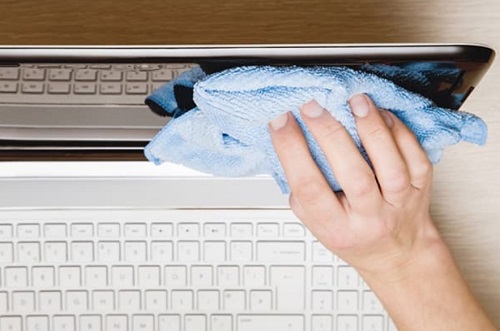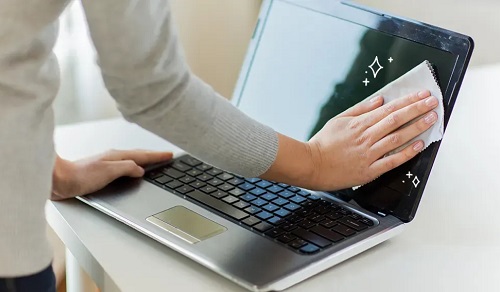Maintaining a clear and spotless laptop screen is crucial for a pleasant viewing experience. Dust, fingerprints, and smudges can accumulate quickly, affecting visibility and potentially causing eye strain. Proper cleaning not only improves screen clarity but also prolongs the lifespan of your device. This guide will walk you through easy and effective methods on how to clean laptop screen, ensuring it remains pristine. Whether you’re dealing with stubborn streaks or regular dust buildup, we’ve got you covered with the best tips and tricks.

Essential Supplies for Cleaning Your Laptop Screen
Microfiber Cloths
Microfiber cloths are essential for cleaning laptop screens due to their soft and non-abrasive nature. Unlike regular cloths, microfiber materials can trap dust and dirt particles without scratching the screen. These cloths are highly absorbent, making them ideal for both dry dusting and wiping away cleaning solutions. When choosing a microfiber cloth, look for high-quality options specifically designed for electronic screens to ensure optimal results. Keep a few microfiber cloths on hand to use exclusively for your laptop to avoid contamination from other surfaces.
Screen Cleaning Solution
A good screen cleaning solution is vital for removing smudges and fingerprints without leaving residue. Look for a solution formulated for electronics, as general household cleaners can damage the screen’s coating. These solutions are usually alcohol and ammonia-free, making them safe for delicate screens. You can purchase commercial screen cleaners or make a DIY solution using distilled water and white vinegar. Always apply the solution to a cloth, not directly to the screen, to prevent liquid damage.

Alternative Cleaning Materials
In addition to microfiber cloths and screen cleaning solutions, alternative cleaning materials can be effective. For example, distilled water can be used for light cleaning. For stubborn stains, a mixture of distilled water and isopropyl alcohol can be effective. Compressed air is another useful tool for removing dust from screen edges and keyboard areas. However, avoid using paper towels or rough fabrics, as they can scratch the screen. Using the right materials ensures a clean, streak-free display without causing damage.
Step-by-Step Guide on How to Clean Laptop Screen
Power Off Your Laptop
Before starting the cleaning process, always power off your laptop and unplug it from any power source. This step is crucial for safety and prevents any electrical damage. Cleaning a powered device can lead to short circuits or other electrical issues. Additionally, a powered-off screen is easier to see smudges and dirt. Take a few moments to let your laptop cool down if it’s been in use, ensuring you’re working on a completely powered-off and safe device.
Apply Cleaning Solution to Cloth
Never spray the cleaning solution directly onto the laptop screen. Instead, apply a small amount of the solution onto your microfiber cloth. This method helps to control the amount of liquid used and prevents any potential damage from excess moisture. Lightly dampen the cloth, ensuring it’s not soaking wet. A well-prepared cloth should be slightly moist, enough to clean but not drip. This approach ensures a gentle and safe application of the cleaning solution to the screen.
Wipe the Screen in Circular Motions
Using your dampened microfiber cloth, gently wipe the screen in small, circular motions. This technique helps to lift dirt and smudges effectively without leaving streaks. Start from the top of the screen and work your way down, ensuring even coverage. Avoid applying too much pressure, as this can damage the screen or cause discoloration. If necessary, repeat the process until the screen is completely clean. For stubborn spots, use a slightly firmer circular motion but remain gentle.
Common Mistakes to Avoid When Cleaning Your Laptop Screen
When cleaning your laptop screen, avoid common mistakes that can cause damage. One major mistake is using household cleaners like glass or surface cleaners, which can damage the screen’s coating. Avoid using rough materials like paper towels or tissues that can scratch the screen. Never spray cleaning solutions directly onto the screen; instead, apply them to a cloth. Additionally, avoid using excessive moisture, as this can seep into the device and cause internal damage. By following proper techniques and using the right materials, you can maintain a clean and undamaged screen.
Tips for Maintaining a Clean Laptop Screen
Maintaining a clean laptop screen requires regular care and attention. Use a microfiber cloth for quick daily dusting to prevent the buildup of dirt and smudges. Store your laptop in a clean, dust-free environment to reduce the need for frequent cleaning. Avoid touching the screen with your fingers, and if necessary, use a stylus or touchpad instead. Consider using a screen protector to minimize direct contact and make cleaning easier. Regularly clean your workspace to reduce dust and dirt that can settle on your laptop. These simple habits can keep your screen looking clear and new.
Conclusion
Keeping your laptop screen clean is essential for a clear viewing experience and the longevity of your device. With the right supplies and techniques, you can easily maintain a spotless screen. Remember to use microfiber cloths, proper cleaning solutions, and follow a gentle cleaning process to avoid damage. Avoid common mistakes and adopt regular maintenance habits to ensure your laptop screen remains in excellent condition. By following these tips and tricks on how to clean laptop screen, you can enjoy a pristine display that enhances your productivity and enjoyment.
FAQs:
1.How often should I clean my laptop screen?
It’s recommended to clean your laptop screen at least once a week. Regular cleaning prevents the buildup of dust and smudges, ensuring a clear and pleasant viewing experience. If you use your laptop frequently or in dusty environments, you might need to clean it more often.
2.Can I use glass cleaner to clean my laptop screen?
No, you should avoid using glass cleaner on your laptop screen. Glass cleaners often contain chemicals like ammonia and alcohol, which can damage the screen’s coating. Instead, use a cleaning solution specifically formulated for electronic screens.
3.What should I do if my laptop screen still has smudges after cleaning?
If your screen still has smudges after cleaning, try using a slightly dampened microfiber cloth with a bit more cleaning solution. Gently wipe the affected areas in circular motions. If smudges persist, repeat the process or consider using a screen cleaning solution designed for stubborn marks.

0 Comments